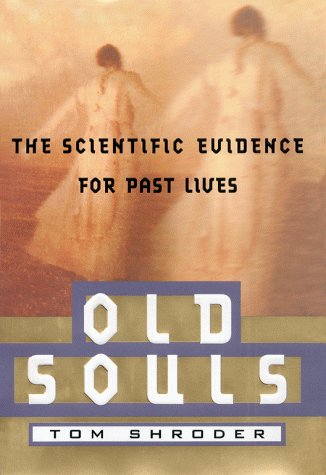In Old Souls, journalist Tom Shroder manages this feat and hands us a volume that is considerable and engaging. Not only do we explore the work of a brave and committed researcher on the slippery slope of reincarnation, we are also treated to a remarkable tour of worlds foreign to us: human existence in post-war Beirut and in the depths of poverty in India. Through the entire journey, Mr. Shroder keeps the primary question lively, carrying the reader through to a closing bit of personal memoir that brilliantly ties the book together into a provocative whole.
Comment: I saw this book at my local library and I brought it with me because the theme is interesting enough and I have read other books with the subject in the past. It's always good to have different perspectives, though.
This is a non-fiction story about reincarnation and past lives. The author is a reporter who joined an expert in his travels to document and find clues about the tales, and how real they were or not, regarding reincarnation.
The study is heavily focused on children who remember past lives or scenes from those past lives and now can't seem to easily accept their new reality or have some difficulty not caring about the past.
In this book the author has included several cases and situations, and he has tried to present the information in a very clinical way, as if all readers could have been skeptics. But, apart from personal beliefs, can this book really highlight this notion for it to be accepted?
Years ago, I was quite dedicated to read the work by Brian Weiss, an American doctor who wrote several books about his experiences using hypnosis and regression to help cure his patients. He divided his work into themes about which problems patients more often present and so on and I liked how fascinating all this sounded.
In this book by Thomas Shroder, I was quite surprised to see the author comparing the work of doctor Ian Stevenson with Brian Weiss and why Stevenson has a much more scientific approach, if one can think in those terms regarding new age theories.
Basically, one can summarize that while Brian Weiss doesn't prove any of the tales mentioned by his patients under regression but uses the "healing" outcome as a factor to determine how effective the treatments/sessions can be.
On the other hand, dr Ian Stevenson wants to document the tales of children who remember past lives/experiences to prove that there is a continuity of out existence but he does not want to force on others that reincarnation is a reality, only that scientifically speaking, all data collected during interviews and visits to those children can be used to prove there wouldn't be any other way for such detailed tales, about real people, could be explained if not by reincarnation.
Comparing the two, I can see why the work of dr Stevenson can be seen as a little more "credible" to use this word, for he does try to collect as much information as possible about the surroundings of each child's tale, to confirm they wee not influenced to say those things, as we could eventually consider regarding Brian Weiss' patients.
For this, dr Ian Stevenson traveled to some countries, namely Lebanon and India, to meet the children face to face and at a later date is when the reporter Thomas Shroder joins him. Some tales are quite impressive, of children remembering different families, situations... but to be honest, how realistic can this be when the cases are so distant from us or from the everyday western reality? I can see where the study was going and it can be understood that people in Lebanon and India also have different beliefs and religions so their acceptance of this possibility can be easier to believe as well as their predisposition to "live" through those experiences.
However, the lack of more tales about this everywhere... this can be certainly a complicated element to control. To have more cases, everywhere - and not just on specific parts of thw world - seems to be quite a break on the theory. But are western people really ready to accept this reality unless more or better scientific evidence is found? But how to prove the existence of something you can't really see, as the notion of "soul"?
I actually liked the book isn't meant for us to be convinced we should believe in reincarnation or not. But if that was the point... it's difficult to imagine.
I suppose I saw this book more as the chance to red about people's experiences and how they affected them. The outcome wasn't as "romantic" as the cases from Brian Weiss' books because the children who shared their tales here rarely end up "healed" for they don't have a problem to begin with, if we can assume reincarnation as something natural. But, of course, at the same time, it's not as impressive or fascinating to read about like this either.
All in all, this book has interesting notions, interesting subjects addressed but I can't say my way of thinking was terribly affected. Some sections were well done and do provide curious discussions but what a pity more information/knowledge can't be investigated int his field.
Grade: 6/10

No comments:
Post a Comment